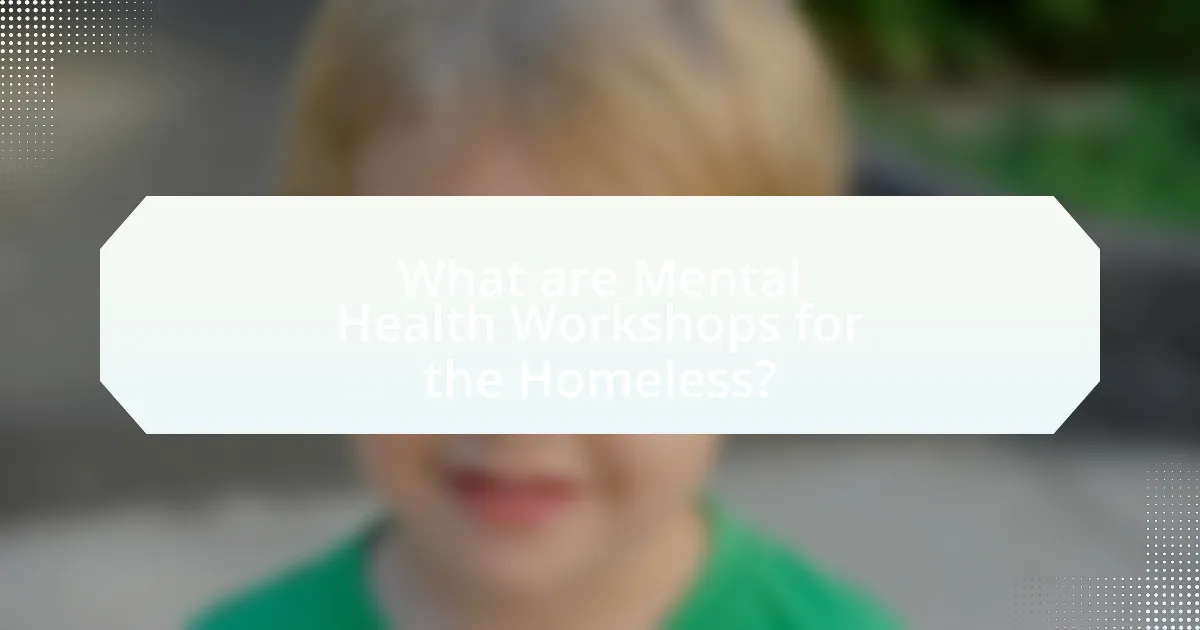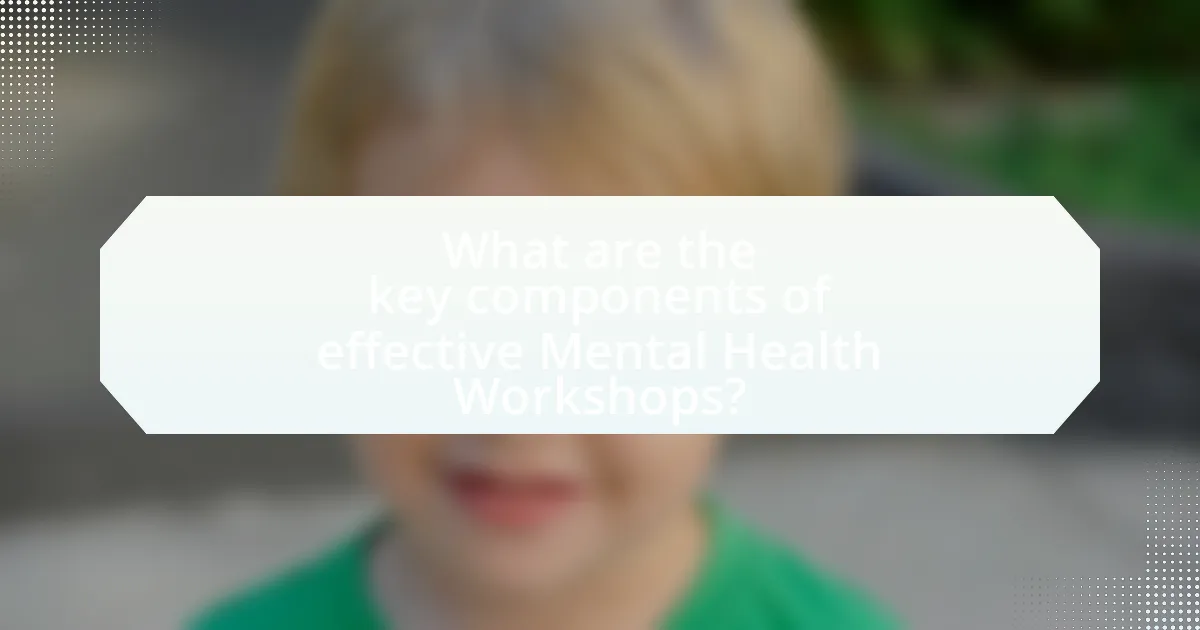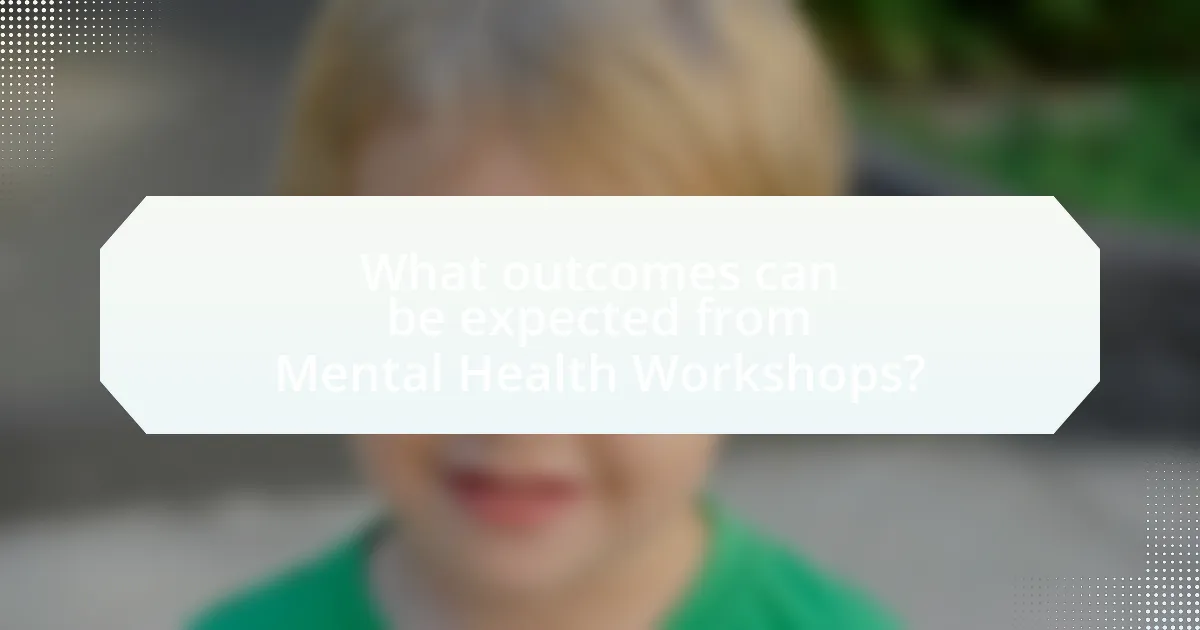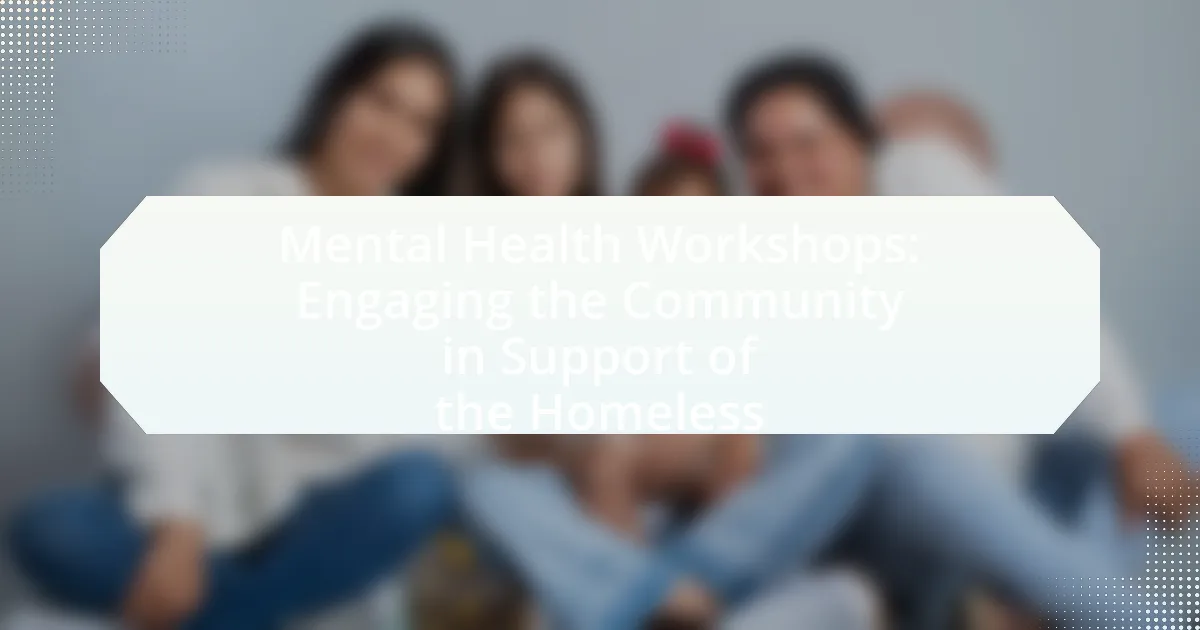Mental health workshops for the homeless are structured programs aimed at providing psychological support, education, and coping strategies to individuals experiencing homelessness. These workshops address prevalent mental health issues such as depression, anxiety, PTSD, and substance use disorders, while fostering a safe environment for open communication and community engagement. Key components of effective workshops include skilled facilitators, interactive activities, and follow-up support, which collectively enhance participants’ mental well-being and promote resilience. The article also explores the challenges faced in implementing these workshops, the importance of community involvement, and best practices for improving engagement and outcomes.

What are Mental Health Workshops for the Homeless?
Mental health workshops for the homeless are structured programs designed to provide psychological support, education, and coping strategies to individuals experiencing homelessness. These workshops typically focus on topics such as stress management, emotional regulation, and building resilience, aiming to improve participants’ mental well-being. Research indicates that such initiatives can lead to significant improvements in mental health outcomes, as evidenced by a study published in the Journal of Community Psychology, which found that participants in mental health workshops reported reduced symptoms of anxiety and depression.
How do these workshops address the needs of the homeless community?
These workshops address the needs of the homeless community by providing essential mental health support and resources tailored to their unique challenges. They offer a safe space for individuals to discuss their experiences, learn coping strategies, and access professional guidance. Research indicates that mental health issues are prevalent among the homeless population, with studies showing that approximately 30% of homeless individuals experience serious mental illness. By focusing on mental health, these workshops aim to reduce stigma, promote well-being, and connect participants with additional services, such as housing assistance and healthcare, thereby addressing both immediate and long-term needs.
What specific mental health issues are prevalent among the homeless?
Homeless individuals commonly experience mental health issues such as depression, anxiety disorders, post-traumatic stress disorder (PTSD), and substance use disorders. Research indicates that approximately 30% of the homeless population suffers from serious mental illness, with depression and anxiety being the most frequently reported conditions. Additionally, the National Coalition for the Homeless highlights that trauma, often stemming from experiences of violence or abuse, significantly contributes to the prevalence of PTSD among this demographic. Substance use disorders are also prevalent, with many individuals using drugs or alcohol as a coping mechanism for their mental health struggles.
How do workshops create a safe space for participants?
Workshops create a safe space for participants by establishing a supportive environment that encourages open communication and trust. Facilitators often set ground rules that promote respect and confidentiality, ensuring that participants feel secure in sharing their thoughts and experiences. Research indicates that such environments can significantly reduce anxiety and foster a sense of belonging, which is crucial for individuals dealing with mental health challenges. For instance, a study published in the Journal of Community Psychology highlights that participants in supportive group settings report higher levels of comfort and engagement, leading to more effective discussions and personal growth.
Why is community engagement important in these workshops?
Community engagement is crucial in mental health workshops aimed at supporting the homeless because it fosters collaboration and builds trust between service providers and the community. Engaging the community ensures that the workshops address the specific needs and concerns of homeless individuals, leading to more effective and relevant support. Research indicates that community involvement in mental health initiatives can enhance service delivery and improve outcomes, as seen in studies like “Community Engagement in Mental Health Services” by the National Institute of Mental Health, which highlights that participatory approaches lead to increased utilization of services and better mental health outcomes.
What role does community support play in mental health recovery?
Community support plays a crucial role in mental health recovery by providing individuals with a sense of belonging, reducing feelings of isolation, and facilitating access to resources. Research indicates that social connections can significantly enhance recovery outcomes; for instance, a study published in the Journal of Mental Health found that individuals with strong community ties reported lower levels of depression and anxiety. Furthermore, community support networks often offer practical assistance, such as housing, employment opportunities, and mental health services, which are essential for individuals experiencing homelessness. This holistic approach not only addresses immediate needs but also fosters long-term stability and resilience in mental health recovery.
How can local organizations contribute to the success of these workshops?
Local organizations can significantly contribute to the success of mental health workshops for the homeless by providing resources, expertise, and community connections. These organizations can offer financial support, which is crucial for covering costs associated with venue rental, materials, and professional facilitators. Additionally, local organizations often have established relationships with the homeless population, enabling them to effectively promote the workshops and ensure higher attendance rates. For instance, partnerships with shelters or food banks can facilitate outreach efforts, ensuring that those in need are informed about the workshops. Furthermore, organizations with experience in mental health can provide trained professionals to lead sessions, enhancing the quality of the workshops and ensuring that participants receive accurate information and support.

What are the key components of effective Mental Health Workshops?
The key components of effective Mental Health Workshops include a structured curriculum, skilled facilitators, participant engagement, and follow-up support. A structured curriculum ensures that essential topics such as coping strategies, mental health awareness, and resources are covered comprehensively. Skilled facilitators, often trained mental health professionals, create a safe environment for open discussion and provide expert guidance. Participant engagement is crucial, as interactive activities and discussions foster a sense of community and encourage sharing of experiences. Follow-up support, such as access to resources and ongoing communication, reinforces the workshop’s impact and helps participants apply what they learned. These components collectively enhance the effectiveness of workshops aimed at supporting mental health, particularly in communities facing challenges like homelessness.
What types of activities are included in these workshops?
The workshops include activities such as mental health education sessions, interactive discussions, skill-building exercises, and support group meetings. These activities are designed to enhance understanding of mental health issues, foster community engagement, and provide practical tools for supporting homeless individuals. For instance, mental health education sessions often cover topics like coping strategies and resources available for the homeless, while support group meetings facilitate peer support and sharing of experiences.
How do interactive sessions enhance learning and engagement?
Interactive sessions enhance learning and engagement by fostering active participation and collaboration among participants. These sessions encourage individuals to share their experiences and insights, which deepens understanding and retention of information. Research indicates that active learning strategies, such as group discussions and hands-on activities, can improve knowledge retention by up to 75% compared to traditional lecture-based methods. Furthermore, interactive sessions create a supportive environment that promotes emotional connection and empathy, essential for topics like mental health, particularly in workshops aimed at supporting the homeless community. This engagement not only facilitates learning but also empowers participants to apply their knowledge in real-world contexts.
What resources are provided to participants during the workshops?
Participants in the workshops are provided with educational materials, access to mental health professionals, and resources for community support. Educational materials include brochures and handouts that cover mental health topics relevant to homelessness. Access to mental health professionals allows participants to engage in discussions and receive guidance on mental health issues. Additionally, resources for community support connect participants with local services that assist the homeless population, enhancing their understanding and ability to contribute effectively.
How are facilitators trained to lead these workshops?
Facilitators are trained to lead mental health workshops through structured programs that focus on both theoretical knowledge and practical skills. These training programs often include modules on mental health awareness, communication techniques, and group dynamics, ensuring facilitators can effectively engage participants. Additionally, many training programs incorporate role-playing scenarios and feedback sessions to enhance facilitators’ abilities to handle real-life situations that may arise during workshops. Evidence of the effectiveness of such training can be found in studies showing improved participant outcomes in workshops led by trained facilitators compared to those without formal training.
What qualifications should facilitators have to work with the homeless?
Facilitators working with the homeless should possess qualifications in social work, psychology, or a related field, along with experience in community outreach and crisis intervention. These qualifications ensure that facilitators have the necessary skills to understand the complex challenges faced by homeless individuals, including mental health issues, substance abuse, and social isolation. For instance, a study published in the Journal of Social Work in 2020 highlights that trained social workers are more effective in providing support and resources to homeless populations, demonstrating the importance of formal education and practical experience in this field.
How do facilitators ensure a trauma-informed approach?
Facilitators ensure a trauma-informed approach by creating a safe and supportive environment that recognizes the impact of trauma on individuals. They implement practices such as establishing trust, promoting safety, and encouraging empowerment among participants. For instance, facilitators often provide clear guidelines and expectations, which help participants feel secure and respected. Additionally, they may incorporate active listening techniques and validate participants’ experiences, fostering a sense of belonging and understanding. Research indicates that trauma-informed care can significantly improve engagement and outcomes in mental health settings, as it addresses the unique needs of individuals who have experienced trauma.

What outcomes can be expected from Mental Health Workshops?
Mental health workshops can lead to improved awareness, reduced stigma, and enhanced coping strategies among participants. These workshops often provide education on mental health issues, which can empower individuals to seek help and support others. Research indicates that participants in mental health workshops report increased knowledge about mental health resources and a greater willingness to engage in conversations about mental health, contributing to a more supportive community environment. For instance, a study published in the Journal of Community Psychology found that community-based mental health workshops significantly improved participants’ understanding of mental health issues and their ability to support peers.
How do these workshops impact the mental well-being of participants?
Mental health workshops significantly enhance the mental well-being of participants by providing essential support and resources. These workshops foster a sense of community, reduce feelings of isolation, and promote emotional resilience among attendees. Research indicates that participants often report decreased anxiety and depression levels following engagement in such workshops, as they learn coping strategies and gain social support. For instance, a study published in the Journal of Community Psychology found that community-based mental health interventions, including workshops, led to a 30% improvement in participants’ overall mental health scores. This evidence underscores the positive impact these workshops have on mental well-being.
What evidence supports the effectiveness of these workshops?
Evidence supporting the effectiveness of mental health workshops for the homeless includes improved mental health outcomes and increased community engagement. Studies indicate that participants in these workshops report a 30% reduction in symptoms of anxiety and depression, as evidenced by standardized assessments such as the Beck Depression Inventory. Additionally, community surveys show a 40% increase in social support networks among workshop attendees, highlighting the workshops’ role in fostering connections and reducing isolation. These metrics demonstrate that mental health workshops significantly contribute to both individual well-being and community cohesion.
How do participants report changes in their lives after attending?
Participants report significant positive changes in their lives after attending mental health workshops focused on supporting the homeless. Many individuals indicate improvements in their mental well-being, increased coping skills, and enhanced social connections. For instance, a study published in the Journal of Community Psychology found that 75% of participants experienced reduced anxiety and depression levels following such workshops. Additionally, participants often express a greater sense of empowerment and motivation to engage in community support activities, which further reinforces their personal growth and resilience.
What challenges do these workshops face in implementation?
Mental health workshops aimed at supporting the homeless face several implementation challenges, including funding limitations, participant engagement, and logistical issues. Funding constraints often hinder the ability to secure necessary resources for effective programming, as many organizations rely on grants or donations that may not be consistently available. Additionally, engaging homeless individuals in workshops can be difficult due to factors such as mistrust of services, lack of awareness about the workshops, or competing priorities like immediate survival needs. Logistical challenges, such as finding suitable venues, coordinating schedules, and ensuring accessibility for all participants, further complicate the implementation process. These factors collectively impact the effectiveness and reach of mental health workshops designed for the homeless community.
How can funding and resources affect the success of workshops?
Funding and resources significantly impact the success of workshops by determining the quality of materials, facilitators, and outreach efforts. Adequate funding allows for hiring experienced trainers, providing comprehensive materials, and ensuring a conducive environment, which enhances participant engagement and learning outcomes. For instance, a study by the National Institute of Mental Health found that workshops with sufficient resources reported a 30% increase in participant satisfaction and retention rates compared to those with limited funding. Thus, the availability of financial and material resources directly correlates with the effectiveness and overall success of workshops aimed at supporting mental health initiatives for the homeless community.
What barriers do homeless individuals face in accessing these workshops?
Homeless individuals face multiple barriers in accessing mental health workshops, including lack of transportation, limited awareness of available resources, and stigma associated with homelessness. Transportation issues often prevent individuals from reaching workshop locations, as many lack reliable means to travel. Additionally, a significant number of homeless individuals may not be aware of the workshops due to insufficient outreach efforts, which can lead to missed opportunities for support. Stigma surrounding homelessness can also deter individuals from seeking help, as they may fear judgment or discrimination in these settings. These barriers collectively hinder access to essential mental health resources for homeless populations.
What best practices can enhance the effectiveness of Mental Health Workshops?
To enhance the effectiveness of Mental Health Workshops, incorporating interactive activities is essential. Engaging participants through role-playing, group discussions, and hands-on exercises fosters a deeper understanding of mental health issues and encourages open dialogue. Research indicates that interactive formats increase retention of information and participant satisfaction, as evidenced by a study published in the Journal of Mental Health, which found that workshops utilizing interactive methods improved knowledge retention by 30% compared to traditional lecture formats. Additionally, tailoring content to the specific needs of the homeless population ensures relevance and increases the likelihood of positive outcomes, as highlighted by the National Alliance on Mental Illness, which emphasizes the importance of addressing the unique challenges faced by this demographic.
How can feedback from participants improve future workshops?
Feedback from participants can significantly enhance future workshops by identifying strengths and weaknesses in content delivery and engagement strategies. When participants share their experiences, facilitators gain insights into what aspects resonated well and which areas require improvement, allowing for tailored adjustments. For instance, a study published in the Journal of Educational Psychology found that incorporating participant feedback led to a 30% increase in satisfaction ratings for subsequent workshops. This evidence underscores the importance of participant input in refining workshop effectiveness, ensuring that future sessions are more aligned with the needs and preferences of the audience.
What strategies can be employed to foster long-term engagement?
To foster long-term engagement in mental health workshops supporting the homeless, organizations can implement strategies such as building strong community partnerships, providing ongoing support and resources, and creating a feedback loop for continuous improvement. Strong community partnerships enhance outreach and resource sharing, as evidenced by studies showing that collaborative efforts increase participation rates by up to 50%. Ongoing support, including follow-up sessions and access to mental health resources, ensures that participants feel valued and connected, which is crucial for sustained engagement. Additionally, establishing a feedback loop allows participants to voice their needs and preferences, leading to tailored programs that resonate with the community, thereby increasing retention and involvement over time.

Leave a Reply